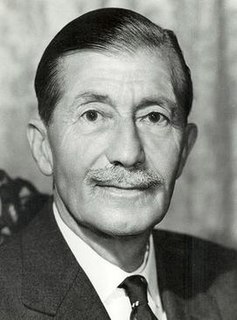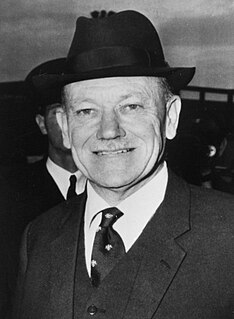
Ian Douglas Smith was a Rhodesian politician, farmer, and fighter pilot who served as Prime Minister of Rhodesia from 1964 to 1979. He was the country's first premier not born abroad, and led the predominantly white government that unilaterally declared independence from the United Kingdom in November 1965, following prolonged dispute over the terms. He remained Prime Minister for almost all of the 14 years of international isolation that followed, and oversaw Rhodesia's security forces during most of the Bush War, which pitted the unrecognised administration against communist-backed black nationalist guerrilla groups. Smith, who has been described as personifying white Rhodesia, remains a highly controversial figure—supporters portray him as a man of integrity and vision "who understood the uncomfortable truths of Africa," while his opponents consider him "an unrepentant racist."

The Unilateral Declaration of Independence (UDI) was a statement adopted by the Cabinet of Rhodesia on 11 November 1965, announcing that Rhodesia, a British territory in southern Africa that had governed itself since 1923, now regarded itself as an independent sovereign state. The culmination of a protracted dispute between the British and Rhodesian governments regarding the terms under which the latter could become fully independent, it was the first unilateral break from the United Kingdom by one of its colonies since the United States Declaration of Independence in 1776. The UK, the Commonwealth and the United Nations all deemed Rhodesia's UDI illegal, and economic sanctions, the first in the UN's history, were imposed on the breakaway colony. Amid near-complete international isolation, Rhodesia continued as an unrecognised state with the assistance of South Africa and Portugal.

Sir Roland "Roy" Welensky, was a Northern Rhodesian politician and the second and last Prime Minister of the Federation of Rhodesia and Nyasaland.

Clifford Walter Dupont, GCLM, ID was a Rhodesian politician who served in the internationally unrecognised positions of Officer Administrating the Government and President. Born in London and qualifying as a solicitor, Dupont served during the Second World War as an officer of the British Royal Artillery in North Africa before first visiting Southern Rhodesia in 1947. He returned a year later, started a ranch and emigrated full-time during the early 1950s, by which time the country had become a territory of the Federation of Rhodesia and Nyasaland.

John James Wrathall, GCLM, ID, was a Rhodesian politician. He was the last white President of Rhodesia. He formerly worked as a chartered accountant.

Rhodesia had limited democracy in the sense that it had the Westminster parliamentary system with multiple political parties contesting the seats in parliament, but as the voting was dominated by the White settler minority, and Black Africans only had a minority level of representation at that time, it was regarded internationally as a racist country.

The Rhodesian general election of 30 July 1974 saw the Rhodesian Front of Ian Smith re-elected, once more winning every one of the 50 seats elected by white voters.

The Southern Rhodesia general election of 1962 took place on 14 December 1962. Voters elected 65 members of the Legislative Assembly. The election was notable for bringing to power the Rhodesian Front, initially under Winston Field, which set the colony on the course for its eventual Unilateral Declaration of Independence.

The Rhodesian general election of 31 August 1977 was the last general election in Rhodesia dominated by the white minority. Prime Minister Ian Smith, who was conducting negotiations with moderate African nationalists, was forced into an early election by the defection of twelve MPs from his Rhodesian Front party, which denied him the two-thirds majority of the House of Assembly needed to change the constitution. In the event, the Front overwhelmed the breakaway Rhodesian Action Party and all other forces, once again winning every single seat in the 50 seats elected by those of European descent.

The Rhodesia cricket team played first-class cricket and represented originally the British colony of Southern Rhodesia and later the unilaterally independent state of Rhodesia which became Zimbabwe. In 1980 the Rhodesia cricket team was renamed as the Zimbabwe-Rhodesia cricket team, and in 1981 it adopted its current name of the Zimbabwe national cricket team.
This article is an introduction to the history of first-class cricket in Zimbabwe, formerly Rhodesia and Southern Rhodesia. The timespan of the article is from the formation of a first-class Rhodesian team in August 1890 until the inaugural Test appearance of Zimbabwe in October 1992.

A double referendum was held in Rhodesia on 20 June 1969, in which voters were asked whether they were in favour of or against a) the adoption of a republican form of government and b) the proposals for a new Constitution, as set out in a White paper and published in a Gazette Extraordinary on 21 May 1969. Both proposals were approved. The country was subsequently declared a republic on 2 March 1970.

The modern political history of Zimbabwe starts with the arrival of white people to what was dubbed Southern Rhodesia in the 1890s. The country was initially run by an administrator appointed by the British South Africa Company. The prime ministerial role was first created in October 1923, when the country achieved responsible government, with Sir Charles Coghlan as its first Premier. The third Premier, George Mitchell, renamed the post Prime Minister in 1933.

Sir Thomas Hugh William Beadle was a Rhodesian lawyer, politician and judge who served as Chief Justice of Southern Rhodesia from March 1961 to November 1965, and as Chief Justice of Rhodesia from November 1965 until April 1977. He came to international prominence against the backdrop of Rhodesia's Unilateral Declaration of Independence (UDI) from Britain in November 1965, upon which he initially stood by the British Governor Sir Humphrey Gibbs as an adviser; he then provoked acrimony in British government circles by declaring Ian Smith's post-UDI administration legal in 1968.

Rowan Cronjé was a Rhodesian politician who served in the cabinet under prime ministers Ian Smith and Abel Muzorewa, and was later a Zimbabwean MP. He emigrated to South Africa in 1985 and served in the government of Bophuthatswana.
Richard Brathwaite Hope Hall ICD was a British-born merchant banker, businessman, and politician active in Rhodesia during the 1960s and 70s. A member of Prime Minister Ian Smith's UDI cabinet, he served as a member of parliament in Rhodesia's House of Assembly from 1965 to 1976. He began his political career as a member of the Dominion Party, and served as its chairman from 1960 to 1962. In 1962, he was a founding member of the Rhodesian Front, but switched to the Rhodesian Action Party in 1976. After unsuccessfully running for re-election in 1977, he moved back to the United Kingdom, where he lived until his death.
Ronald Takawira Douglas Sadomba was a Rhodesian politician who served in the House of Assembly from 1970 to 1979. In 1979, he served in the Parliament of the short-lived Rhodesian successor state, Zimbabwe Rhodesia, prior to Zimbabwe's independence. He entered politics as a member of the Centre Party, and changed parties several times, joining throughout his career the African National Council, the United African National Council, ZANU–PF, and United Parties.
George Rollo Hayman was a Rhodesian farmer and politician. A member of the House of Assembly, he served in several portfolios as a member of the Cabinet of Rhodesia under Prime Minister Ian Smith. Born in the United Kingdom, he moved to Southern Rhodesia at age four and served as a Royal Air Force pilot in World War II.
John "Jack" McVicar Malloch ICD, was a South African-born Rhodesian bush pilot, gun-runner and sanctions-buster who flew in World War II and in various legal and illegal roles around Africa and the Middle East until the early 1980s. in 1978, he was the final recipient of the Rhodesian civil Independence Commemorative Decoration for services rendered to the country.

The Parliament of Rhodesia was the bicameral legislature in Rhodesia from 1970 to 1979. Several elections were held, last in 1977.











